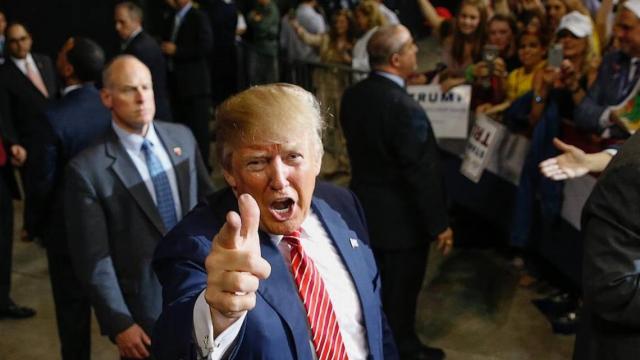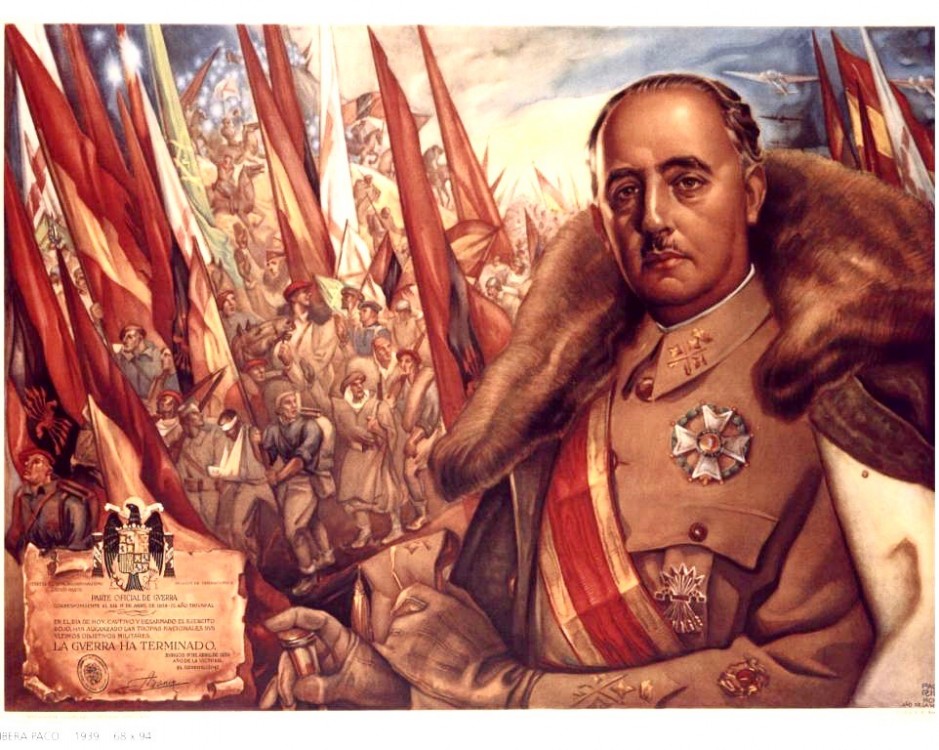
“I love this country. We’re going to make this country great again. It’s payback time.” — Donald Trump
The mainstream press in the United States, especially the cable news networks, have spent most of the last year giving free publicity to Donald Trump’s substance-free campaign for president. While they are quick to report on the candidate’s every utterance no matter how outrageous, they rarely press him on his dangerous rhetoric or the lies he tells. After all, Trump has been a ratings bonanza and network bosses like CEO Leslie Moonves of CBS have no doubt warned reporters about the professional consequences of losing access to the mogul.
Let's admit, the real estate magnate occasionally makes some sense when he talks about an economy that has left many Americans, and most of his followers, behind. As someone who has spent years taking advantage of the political system for personal gain, Trump is uniquely placed to comment on its evils. Though lacking in specifics, his denunciations of deals like NAFTA and the TPP would be refreshing coming from the mouth of almost any candidate – if they weren't submerged in the kind of xenophobic bile that's become his campaign signature.
Indeed, Trump has played the media well, saying one thing to supporters, then later walking it back on “serious" shows like “Meet the Press,” which he knows his fans won’t be watching. Even liberal websites posted story after story about Trump in an endless search for clicks and shares that often gave less attention to the populist swell on the other side of the aisle – that is, until the string of primary victories when Sen. Bernie Sanders's appeal, often speaking to similar issues, could no longer be ignored.
Some media are finally comparing Trump to Adolf Hitler, but this is just a show of journalistic laziness. The only thing unique about Trump is how much of his reputation he owes to reality TV. Otherwise he is a run of the mill strongman. Besides, if one must go back that far in time in search of similar nativism, one needn’t look to Nazi Germany to find it.
A Recurring Nightmare
As author Edward McClelland wrote recently on Salon, from the late nineteenth century through the Great Depression, the U.S. experience a similar movement against immigration, aimed mostly at those coming from Europe. Here is what the National Civic Federation said in 1918 of German immigrants fleeing the chaotic end of the First World War: “Shall we permit the bestial hordes who ravished Belgium women and bayoneted little children to make their homes where American womanhood is held sacred and innocent childhood is loved?”
The same time period also saw a revival of the KKK, which found new targets for their hate, attacking not only African-Americans but newly arrived Roman Catholics and Jews. The religions and ethnicities may have changed, but the core nativism that the former Celebrity Apprentice host promotes is much the same: a full throated call for a simpler, more ignorant time that only ever really existed in the imagination.
This isn’t to say that Trump doesn’t have fascist tendencies; all strongmen do. His economic platform, at least in the vague terms it has been expressed, has similarities to that of Argentina’s Juan Peron, whose ”third position... consisted of standing against international capitalism and international communism.” Peron had spent time in Mussolini’s Italy, the birthplace of modern state corporatism, and had been much impressed by Il Duce’s economic model.
The idea of having corporations directly in charge of government would no doubt have some appeal to Trump, who assures voters that he is going to put his “dealmaker” friends in charge of trade when he is president. These days, though, Trump and his supporters seem more to want to usher in a new era of McCarthyism – one squarely aimed at leftists, especially those with the audacity to say that Black Lives Matter.
More relevant to a discussion of the tycoon’s rise are other comparisons drawn from our own time. Even now, the mainstream U.S. press mainly looks to Europe for explanations when tendencies jump out about a fascistic rise to power; think of the current, polarizing political environment in Hungary, France, the U.K. and Greece. These are slickly tailored representatives of a more contemporary manifestation of nationalism, and Trump seems to have pilfered much of his platform from them.
Not So “Exceptional”
Although he has a particularly American style based on his presumed “success” as a businessman, Trump’s positions on immigration could have been taken from any number of prominent far right politicians in Europe. In fact, U.K. Independence Party leader Nigel Farage made this point when speaking at the rightwing Heritage Foundation last year: “I do think some of the things he’s picked up on the last few weeks are very similar to the kind of things we’ve picked up on in British politics – the feeling that there is a centralized bureaucracy in Washington, maybe not connecting with some of the concerns of ordinary people.”
There are other interesting parallels between Trump and the UKIP leader. Both are from privileged backgrounds, yet somehow represent themselves as “men of the people.” Both are also prone to throwing childlike tantrums when they lose. While more restrained than America's media madness over Trump, the British press has exhibited a similar fascination with Farage, who is making it his mission to get Britain out of the EU while he receives a large paycheck (plus a salary for his wife) from the very institution he rails against.
Trump has articulated the xenophobia bordering on outright racism of many Tea Party Republicans in a similar way that Viktor Orban and his Fidesz government in Hungary have bled the extremist Jobbik Party of supporters. Jobbik is openly fascist, while Fidesz, which has stolen much of Jobbik's platform, is considered a “legitimate” center-right political party, enabling Hungarians to vote for them without feeling ashamed.
As one of young Fidesz supporter put it, “I support our Prime Minister because I think Mr. Orban is one of the persons who can really protect the borders. The question you have to decide is to protect the borders or to be politically correct for Europe – that’s the question the party had to consider.”
This adherence to “political correctness,” so reviled on the right, is what is being addressed. Trump uses this canard, as do rightest European leaders and parties, to engage in what would otherwise be called hate speech against those least able to defend themselves. The belief of these far rightests – that they should be able to denigrate whole swathes of humanity without pushback – is simply absurd. But with most of the media focused on being “objective” in their reporting, the demagogues get their wish.
As other commentators have noted, net migration from Mexico is below zero; the refugees, most of them children who have arrived at the U.S.’s southern border over the last couple of years, have been fleeing violence in their home countries in Central America, a situation for which the American government must accept some measure of responsibility. It is not “political correctness” that should move people to help these children. It’s simple morality.
Ironically, those who are most likely to be sympathetic to the economic grievances of Trump’s supporters – but not to their nativist tribalism – are Bernie Sanders backers and others on the left. Trump's mainly white, working class followers are not excluded from the 99%. On the contrary. But many of them would rather have a substance free, rambling savior figure than actually have to do the work of creating a “political revolution” like Sen. Sanders has called for.
Trump has gone against conservative orthodoxy in his defense of programs like Social Security and Medicare, but rather than hurting him, these positions only make him more popular with a Republican base still reeling from the effects of the 2008 financial crisis. They, too, saw their savings evaporate in an economic environment that benefited the top 1% and almost no one else. Their anger is understandable. But it's misplaced when directed at young people and minority groups whose struggles are often much worse.
While it seems unlikely that Trump could win the general election – a recent poll showed that half of American women would never vote for him – his rise over the last few months has defied all predictions, especially those made by the elite media who proclaimed the Trump phenomenon over with each new outrage he dished up, only to watch his poll numbers ascend. The only other candidate with a similar amount of negatives has already been effectively coronated by the elites on the Democratic side: Hillary Clinton.
One of the dangers of the Trump candidacy, some feel, is that it could actually push the Democratic Party further to the right. The logic to this argument: Hillary Clinton should try to appeal to moderate Republicans, whose hawkish positions aren't so different from many of her own, and win over those conservatives who are turned off by Trump’s buffoonery.
African-Americans, Latinos, Asians and Arab-Americans; young and not-so-young people inspired by Sanders; the LGBTQ community, and many others will feel pressured to vote Democratic on the basis of Clinton’s mainstream rhetoric as she squares off against Bernie Sanders in the final months of the primary season. And if she wins in November, they will be expected to celebrate her victory over the evils of Trumpism. But spoiler alert: those same people shouldn’t be surprised, once the euphoria has worn off, if nothing changes in 2017. The main thing they'll be celebrating is that they didn't get Trump.
3 WAYS TO SHOW YOUR SUPPORT
- Log in to post comments
















Comments
Peter Gray replied on
cogent analysis
I appreciated this view of Mr. Trump as a two-bit parody of failed despots - and their present-day idolators in Europe. It took me a while to figure out who the image at the bottom portrayed. It's Francisco Franco (I've been to his creepy Vaderesque tomb, I should have recognized him). It threw me a bit since you referenced Peron in the article. But altogether a solid analysis, in my humble opinion, particularly regarding Trumpites misdirected anger.
B. Bailey replied on
What? No mention of Bernie Sanders as a contender?
Well, no wonder. He doesn't get the media coverage. He just won 3 states by 68% of the voters. We here who understand that a Trump or Clinton win is just another vote for the status quo, bigotry, xenophobia, banker bedfellows, and corruption - are fighting hard to make the possibility of Sanders getting elected become a probability. We understand that with an obstructionist congress, anyone left of right wing extremism is going to have problems passing or changing any meaningful policies. But we would like "a little help" from progressive media, in Sanders coverage. Thanks!